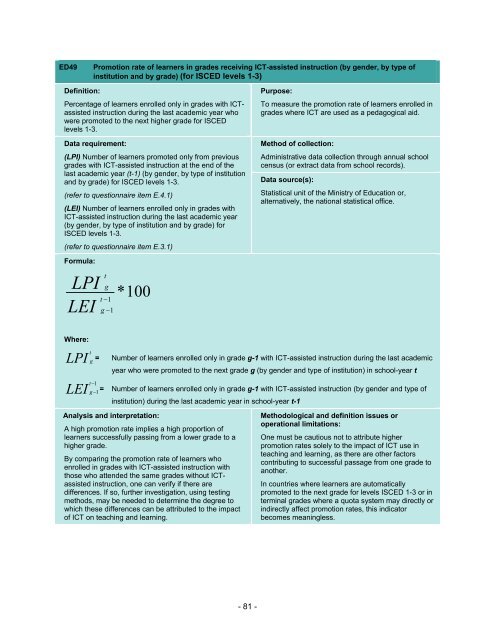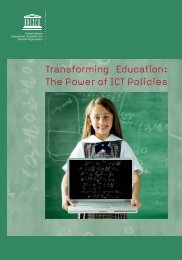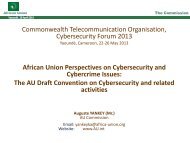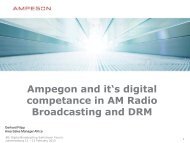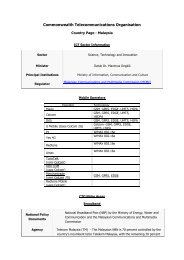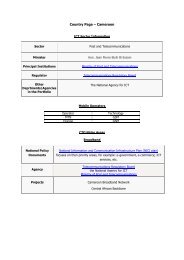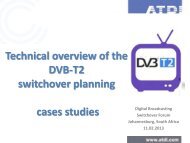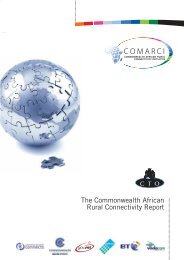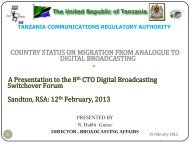Guide to measuring information and ... - unesdoc - Unesco
Guide to measuring information and ... - unesdoc - Unesco
Guide to measuring information and ... - unesdoc - Unesco
You also want an ePaper? Increase the reach of your titles
YUMPU automatically turns print PDFs into web optimized ePapers that Google loves.
ED49 Promotion rate of learners in grades receiving ICT-assisted instruction (by gender, by type of<br />
institution <strong>and</strong> by grade) (for ISCED levels 1-3)<br />
Definition:<br />
Percentage of learners enrolled only in grades with ICTassisted<br />
instruction during the last academic year who<br />
were promoted <strong>to</strong> the next higher grade for ISCED<br />
levels 1-3.<br />
Data requirement:<br />
(LPI) Number of learners promoted only from previous<br />
grades with ICT-assisted instruction at the end of the<br />
last academic year (t-1) (by gender, by type of institution<br />
<strong>and</strong> by grade) for ISCED levels 1-3.<br />
(refer <strong>to</strong> questionnaire item E.4.1)<br />
(LEI) Number of learners enrolled only in grades with<br />
ICT-assisted instruction during the last academic year<br />
(by gender, by type of institution <strong>and</strong> by grade) for<br />
ISCED levels 1-3.<br />
(refer <strong>to</strong> questionnaire item E.3.1)<br />
Formula:<br />
t<br />
LPI g<br />
t 1<br />
g 1<br />
LEI<br />
* 100<br />
- 81 -<br />
Purpose:<br />
To measure the promotion rate of learners enrolled in<br />
grades where ICT are used as a pedagogical aid.<br />
Method of collection:<br />
Administrative data collection through annual school<br />
census (or extract data from school records).<br />
Data source(s):<br />
Statistical unit of the Ministry of Education or,<br />
alternatively, the national statistical office.<br />
Where:<br />
LPI t<br />
g = Number of learners enrolled only in grade g-1 with ICT-assisted instruction during the last academic<br />
year who were promoted <strong>to</strong> the next grade g (by gender <strong>and</strong> type of institution) in school-year t<br />
LEI t1<br />
g<br />
1<br />
= Number of learners enrolled only in grade g-1 with ICT-assisted instruction (by gender <strong>and</strong> type of<br />
Analysis <strong>and</strong> interpretation:<br />
institution) during the last academic year in school-year t-1<br />
A high promotion rate implies a high proportion of<br />
learners successfully passing from a lower grade <strong>to</strong> a<br />
higher grade.<br />
By comparing the promotion rate of learners who<br />
enrolled in grades with ICT-assisted instruction with<br />
those who attended the same grades without ICTassisted<br />
instruction, one can verify if there are<br />
differences. If so, further investigation, using testing<br />
methods, may be needed <strong>to</strong> determine the degree <strong>to</strong><br />
which these differences can be attributed <strong>to</strong> the impact<br />
of ICT on teaching <strong>and</strong> learning.<br />
Methodological <strong>and</strong> definition issues or<br />
operational limitations:<br />
One must be cautious not <strong>to</strong> attribute higher<br />
promotion rates solely <strong>to</strong> the impact of ICT use in<br />
teaching <strong>and</strong> learning, as there are other fac<strong>to</strong>rs<br />
contributing <strong>to</strong> successful passage from one grade <strong>to</strong><br />
another.<br />
In countries where learners are au<strong>to</strong>matically<br />
promoted <strong>to</strong> the next grade for levels ISCED 1-3 or in<br />
terminal grades where a quota system may directly or<br />
indirectly affect promotion rates, this indica<strong>to</strong>r<br />
becomes meaningless.


